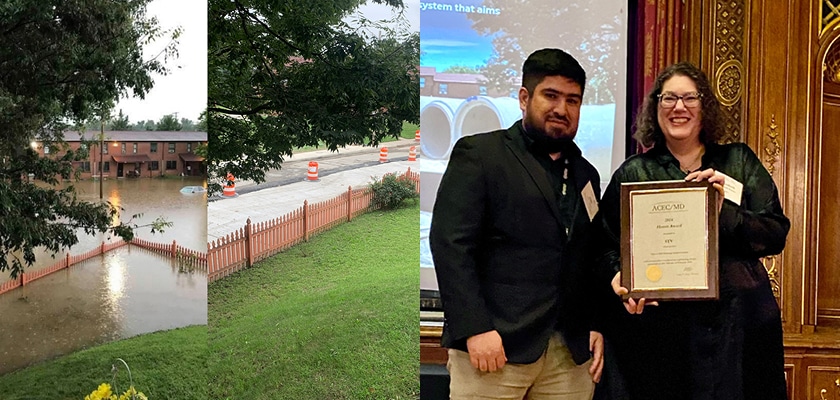
The American Council of Engineering Companies of Maryland (ACEC MD) and the Maryland Quality Initiative (MdQI) each recognized several STV projects that are improving transit, transportation and stormwater management across Maryland:
- MARC (Maryland Area Regional Commuter) Riverside Heavy Maintenance Building: ACEC MD Award of Excellence and the MdQI Modal over $5 Million Award
- Cherry Hill Drainage Improvements: ACEC MD Honor Award
- Timonium Business Park Grade Crossing: MdQI Modal under $5 Million Award
The project teams were recently celebrated at both organizations’ awards galas.
MARC Riverside Heavy Maintenance Building

STV served as the lead designer for the new MARC Riverside Heavy Maintenance Building (RHMB) in Baltimore. The new 32,113-square-foot facility supports 24/7 heavy industrial operations on-site for the Maryland Department of Transportation Maryland Transit Administration (MDOT MTA), increasing MARC train availability and on-time performance for MARC’s 38,000 weekday commuters.
STV’s modern design balances industrial functionality with employee well-being. Structural steel framing accommodates Siemens Chargers and a first-of-its-kind Stanray M3 underfloor wheel truing machine. Strategic daylighting creates an uplifting environment while reducing glare, and ventilation and air handling ensure optimal air quality. By swapping concrete floors for a resinous flooring system, employees enjoy impact, chemical and slip resistance.
“The project’s human-centric design reflected MDOT MTA’s emphasis on their employees and rethinking how we design and use an industrial building like this—we were truly merging functionality with well-being,” said Ryan Barth, P.E., principal and project manager for MARC RHMB, which also won an ENR Mid-Atlantic Best Project award.
“We’re proud that ACEC MD and MdQI recognized how much this project truly sets the standard for designing industrial facilities that are beneficial for the owner and the employees,” said Narendra Bhushan, AIA, NCARB, CDT, LEED AP, senior associate and deputy project manager for MARC RHMB.
Cherry Hill Drainage Improvements

In the Cherry Hill neighborhood of Baltimore, STV designed drainage improvements that are providing residents with safer, flood-free streets. Our team configured the new storm drainage system to replace the existing one, which was facing a blocked outfall, sediment buildup and other system issues that caused chronic flooding for almost 20 years.
The firm initially provided a preliminary design during a 2017 study and was set to start the final design of the multi-year project. But when an April 2022 rainstorm displaced residents when their homes were deemed uninhabitable, the City of Baltimore required an accelerated timetable for design and construction to be completed within one year. STV’s design was executed within five months.
“We understood how crucial this project was to the Cherry Hill community who were constantly seeing their homes, cars and lives disrupted due to the failing drainage system,” said Elizabeth Kanner, P.E., senior associate and project manager for the Cherry Hill improvements. “To complete our design in such a short time frame is a feat in and of itself, so we’re especially grateful for the ACEC MD honor.”
Timonium Business Park At-Grade Crossing

STV served as the lead designer for the rehabilitation of four, at-grade train crossings at Timonium Business Park Light RailLink station in Maryland. The existing crossings were posing dangerous conditions for drivers, trains and pedestrians due to deteriorating rubber crossing pads and poor drainage.
STV’s project team designed a precast concrete panel system and an active subdrain system, as well as ADA-compliant upgrades for sidewalk ramps. The firm also partnered with MTA to coordinate community engagement throughout construction to minimize impacts to local businesses.
“MTA’s Light RailLink sees about 14,200 weekday passengers, with trains passing through this crossing, as well as all kinds of vehicles, daily,” said Ryan Barth, who was also the project manager for Timonium crossing. “This upgraded crossing provides the agency with minimized maintenance costs, which would have been extensive if this crossing remained untouched – I’m excited that MdQI celebrated this project and our team.”